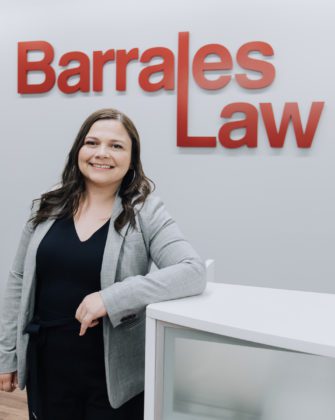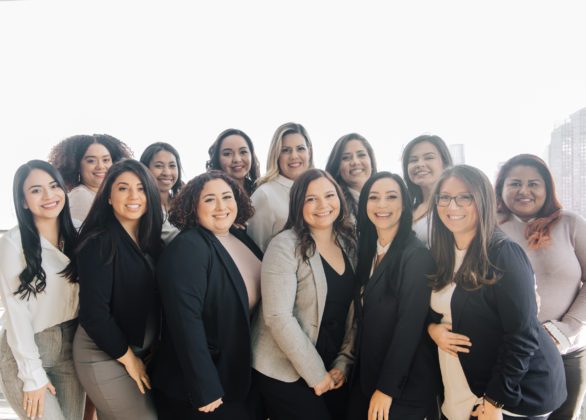By Zoe Licata
Talia Barrales was born in Guadalajara, Mexico with courage and a fiery spirit, crossing the Mexico-U.S. border alone at the mere age of three. Now 35, she runs her own law firm in Boston that works to bridge the gap between law and activism, helping immigrants with the many legal issues and injustices they face every day.
Barrales knew from an early age that she had a passion to help people like her own family. She grew up in California with undocumented parents, seeing firsthand the hurdles families like hers must overcome, and growing a deeper understanding of the personal battles her future clients would be facing, such as political persecution, gang violence, and domestic violence.
“I was driven by my life experience,” Barrales says of her decision to become an immigration lawyer.
“Not only coming here as a child, but growing up in California during Proposition 187 in a highly anti-immigrant environment- similar to now – makes me a successful attorney, because I am able to see the whole picture and the depth of trauma. There are complexities and layers that go into it.”
Proposition 184 determined that undocumented immigrants in California could be denied from using state-run services such as non-emergency health care and public education.
Barrales was a child, watching people around her spew hatred and disdain toward undocumented immigrants while Prop. 187 was in debate — something she parallels to the political climate we continue to see in 2020.
“When I was eight years old I remember sitting in an immigration office in California, waiting with my mother at 5:00am to see an immigration officer. I sat and watched as men in suits skipped the line, wondering ‘how come those people get to skip the line?’ They were lawyers.” It was then that Barrales first decided she’d be a lawyer as well.
Barrales Law is different from most law offices, with every decision and operation running in-line with the firm’s values of “advocacy, community, trust, and empathy.” From the work culture to the office decor, Barrales makes sure everything continues to strive towards these values.
“We handle very difficult cases. We don’t want to weigh down the office, [our clients] are already carrying their own heavy loads,” says Barrales when explaining the firm’s appearance.
“Our office doesn’t look like a normal law office; there’s white tables, no old wood. It looks more like a tech company than a law office.”
Even the people who populate the firm look different than most around the city. The majority of lawyers who staff Barrales Law are Latina and immigrants themselves who have seen both racial and gender inequalities in their field.
Although Barrales didn’t purposely hire mostly women, she says what everyone who works with her must have in common is a desire to work with values and purpose rather than with the usual competitive nature seen in law firms.
“Our goal is to be like one of the big law firms in the city, the well established ones,” says Barrales. “And we don’t have to let go of our personal values or sell out in some way to get to that level.”
Barrales’s work inside the courtroom is only a portion of the work she does. In the past she has held “know your rights” workshops and with the impact of the COVID-19 pandemic, she’s been going on Facebook Live sharing labor laws and workers compensation rights in spanish. While she was obtaining her law degree from the Massachusetts School of Law, Barrales worked as an organizer in East Boston.
“There was such a diverse Latinx community compared to California,” Barrales says she observed in Boston when she first moved. “But there was still a lot of work to do in terms of leveraging power.”
Her work in activism and in the legal field made Barrales realize that both sides were working towards the same goal, but it was difficult for either to do so on their own — one hand cannot work without the other.
“Not all of our answers are going to be in the four walls of the courtroom,” says Barrales.
“Because if we’re not working together, nothing is getting done. I can see it from both sides. For organizers there’s a distrust and uncertainty with lawyers. And lawyers think of activists as dreamers and that the law is the law. I understand the black and white letter of law, but I also understand how to be creative with the law and create case law. We look deeper.”
The ability to look past the restrictive nature of basic law practice helped Barrales to successfully fight against the Trump Administration in Rosales Justo v. Sessions.
Her client, Javier Rosales Justo seeked asylum after his teenage son was kidnapped and brutally murdered in Mexico by a local gang. Sessions argued that Rosales would be safe to return to his home country because the government had put in place resources to help with gang activity.
After failing to get his case taken on by dozens of lawyers, Rosales found Barrales. She won the case, arguing that asylum seekers can stay in the U.S. if the resources their home countries promote are inadequate to provide safety. The victory was a landmark move that is now used in reference for other asylum cases, and was recently cited in an ACLU case involving several families seeking asylum.
“I don’t think he even understands the importance of his case, he just knows we won,” Barrales says of Rosales. When asked how she feels about the impact of her case, Barrales is proud and grateful, but she clarifies that just because a case is won, doesn’t mean it’s a complete victory.
“These narratives are just families, destroyed families,” Barrales says, pointing out that Rosales couldn’t bring back his son, or take away the awful things done to him. This is why she continues to strive towards doing more and providing more.
“Our work doesn’t stop when they get their green cards,” she emphasizes.
In line with this mission to do more, Barrales started Barrales Public Affairs this year, providing guidance and resources for companies and organizations, with an “added focus of helping organizations reach the growing communities and influencers of color.”
Similar to when she started her law firm, Barrales wanted to create a place that broke down the usual barriers of a public affairs office.
“Everyone comes from various backgrounds,” Barrales says of her new team, which is run by minority executives, each with at least 20 years of leadership experience in “national and local political organizing, strategic and crisis communications, and community engagement.”
The founders include an emergency doctor and president of the New England Medical Association, a former strategist and communications director for Boston City Council, and a political strategist.
“In most public affairs firms there’s not enough input from people who understand what is happening in communities,” says Barrales, comparing it to the lack of collaboration between lawyers and activists. “Everyone is staying in their box. It makes sense, it’s the work we like to do.”
Barrales Law was also recently selected by the Stanford Latino Entrepreneur Initiative (SLEI), a program working with successful Latinx-run businesses to research business practices & leadership, and facilitate collaboration.
According to the program, “only 2 percent of Latinas break $1 million in business revenue” with only 3 percent of Latinx business owners in general breaking the $1 million mark.
The selection by SLEI shows Barrales is an innovator in the Latinx community, and she has become an example of when you don’t see places that are doing that work you feel is needed, you create it yourself.
“We’re always putting forward our mission and values,” says Barrales. “And we continue to work to get to the next level…grow faster, fill more need, and build a stronger foundation for generations to come.”










